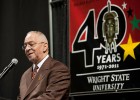
Rev. Dr. Jeremiah Wright, pastor emeritus of Chicago’s Trinity United Church of Christ, spoke January 19 at the Wright State Nutter Center as part of the celebration of the 40th anniversary of the Bolinga Black Cultural Resources Center.
1971.
The Congressional Black Caucus was organized.
Busing to achieve racial desegregation was upheld by the U.S. Supreme Court.
And the Bolinga Black Cultural Resources Center was born at Wright State University.
“Schools were starting to see that students really needed a sense of community, even away from home,” said Dana Patterson, Ph.D., Bolinga’s director/lecturer.
“The center really was to create a space where students could feel comfortable congregating, sharing information, coming together to learn more about their history, about their arts,” Patterson added. “And not just African American students–but it would be a hub for the dissemination of that information throughout the campus.”
To mark the 40th anniversary of the center’s Jan. 15, 1971, founding, the Bolinga administration is planning an array of events in January.
On Jan. 17, Martin Luther King Day, students from kindergarten through high school are invited to Freedom Day in tandem with the Dayton International Peace Museum to learn about King’s philosophy of non-violence.
Bolinga is also sponsoring a Jan. 19 talk by the Rev. Dr. Jeremiah A. Wright, Jr., pastor emeritus of Chicago’s Trinity United Church of Christ whose sermons about terrorism ignited controversy. The next day, Jan. 20, Martin Luther King, Jr. Distinguished Service Awards will be presented to students, faculty, staff and community members who fight poverty, violence and oppression. And Hunger Awareness Day will be marked on Jan. 27 to generate donations to a local food pantry.
Bolinga means “love” in Lingala, a Bantu language spoken in central Africa, Patterson explained.
The Bolinga center operates from the first floor of Millett Hall. The reception/reading area is dressed with African paintings and sculptures. An original abstract painting by acclaimed Dayton cultural leader Willis “Bing” Davis titled “Ancestral Spirit Dance” features drums and dancing.
Shelves are stuffed with books on such topics as African history and politics, Martin Luther King Jr., Frederick Douglas, the Underground Railroad and black theater. One-page biographies of African American notables such as Fred Shuttlesworth, Carl Stokes, Toni Morrison and C. J. McLin stand in plastic display cases.
The center houses student organizations and offers tutoring and mentoring programs.
“We have a direct tie and a direct responsibility to impact the academics of our students,” said Patterson.
Brittani Sinclair, a senior psychology major from Cleveland, uses the center almost daily to study, do research or just soak up inspiration from the artwork. And it helps her connect with African American organizations on campus. The staff is like a second family, often greeting Sinclair with hugs.
“It’s made me a lot more comfortable,” she said of how Bolinga has shaped her college experience. “That extra bit of caring kept me going. It makes you want to strive and do better.”
The Bolinga administration works to raise awareness about the financial necessities of minority students.
“While their needs are growing, the resources are shrinking,” Patterson said. “That’s one of our greatest challenges right now. People don’t know–I think–how much that need is.”
Over the years, the Bolinga administration has been instrumental in investigating and resolving issues that could have divided white and minority students.
But Andrew-Bryce Hudson, Bolinga’s assistant director, believes the center’s biggest achievement is bringing speakers to campus with alternative views. The speakers challenge students to ask hard questions and think for themselves, he said.
“The more diverse ideas we can expose them to during this developmental phase of their lives, then the more choices they have in terms of coming up with their own philosophy of life, coming up with what they truly believe in,” Patterson said.
She said inviting Rev. Wright to speak fits with that goal.
“We’re wanting to know how has his journey–in terms of being an outspoken, being an off-the-beaten-path, sort of swimming upstream–how has his journey enhanced how he sees the world and what has he learned on this journey?” she said.

 Wright State alum Lindsay Aitchison fulfills childhood space-agency dream
Wright State alum Lindsay Aitchison fulfills childhood space-agency dream  Wright State business professor, alumnus honored by regional technology organizations
Wright State business professor, alumnus honored by regional technology organizations  Wright State University Foundation awards 11 Students First Fund projects
Wright State University Foundation awards 11 Students First Fund projects  Gov. DeWine reappoints Board Treasurer Beth Ferris and names student Ella Vaught to Wright State Board of Trustees
Gov. DeWine reappoints Board Treasurer Beth Ferris and names student Ella Vaught to Wright State Board of Trustees  Joe Gruenberg’s 40-Year support for Wright State celebrated with Honorary Alumnus Award
Joe Gruenberg’s 40-Year support for Wright State celebrated with Honorary Alumnus Award 